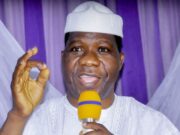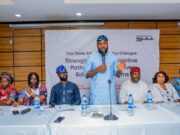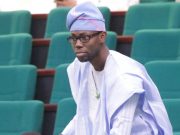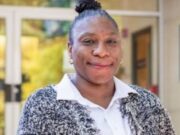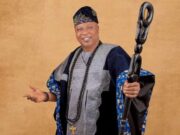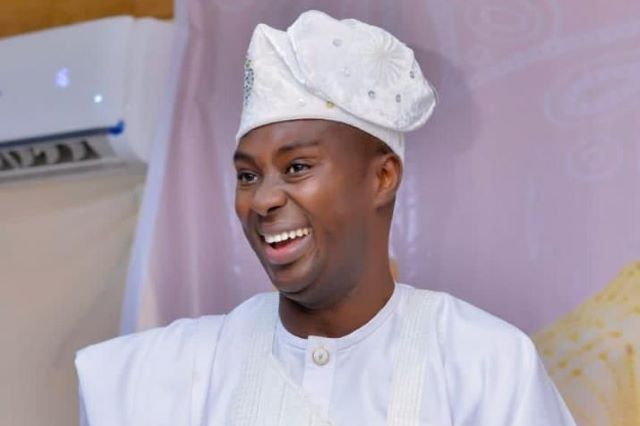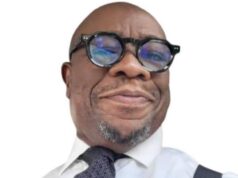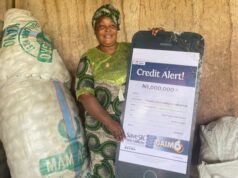In this interview, astute businessman, humanitarian and philanthropist, Dr Akande Kazeem Babatunde here discusses how education standards can be improved upon in Nigeria among other issues. Excerpts:
Can our readers meet you?
I am Dr. Akande Kazeem Babatunde, the CEO of Easy-Prevarsity Education Services. I am the founder of the Ecolerite Institute of Peace Advancement, and Chairman Governing Council; African Institute for Justices of the Peace. I am also the founder of Akande Tunde Movement (ATM), among many other youth and humanitarian organizations that I support and belong to. I am from Ido Local Government Area, Ibadan, the capital city of Oyo State.
This is interesting! Can you tell us a little bit about some of these organizations?
As an individual, I am passionate about championing peace, supporting education, and empowering youths. The organizations I have founded and belong to are built around this vision. The vision is to continue to foster international and communal peace while understanding that education is a right and everyone must be given the opportunity to acquire quality education. In addition, the youths, including me, face a very difficult situation in Nigeria right now with high level of unemployment and other challenges, hence, it is important to support and empower them to ensure that their youthful days are not wasted.
We understand that you just concluded a short term course at the National Institute for Policy and Strategic Studies (NIPSS) in Kuru, right?
Yes. It is an eye opener for me to acquire more knowledge in policy and strategic studies.
Can you tell us about it?
NIPSS is the foremost training institute for existing and potential leaders in Nigeria for different facets of Nigeria as whole leaders in different sectors. The institute is responsible for training ministers, head of service, lawmakers, and public officers in the rudiments of policy making and implementation, strategic thinking, and leadership. The course I attended was a short term course in October 2023 that featured participants from Police Service Commission, Ministry of Foreign Affairs, Federal Airport Authority of Nigeria, and several other government parastatals.
Do you now suggest that government and other agencies in the public and private sectors should enroll their staff to the institute for proper implementation of their policies?
Yes, I will like to suggest it in order to improve all activities of government business including the private sectors that always introduce various policies for indigenes and other members of the public.
You are not a government official, how do you fit into this training?
Well, I have sponsored and championed humanitarian activities for some years. And to be honest, several other wonderful Nigerians are doing the same. However, I have noticed that our solutions to end poverty, support education, and empower the youths are only temporary solutions. There is need to tackle the Nigerian situation from a holistic approach which means understanding the policy and strategies employed by government to tackle this situation and finding gaps that exists in this policy. This is why I decided to attend the institute to learn more about policy, strategy, and leadership.
I want to assume this didn’t come at little cost?
Not at all, but we thank God we were able to pull it off.
Now that the training is done, how do you think it will affect activities in your organizations?
As you would imagine, this training has exposed me to policy making, strategy formulation, and leadership. I believe this will equip me to lead my organization in a better manner. In addition, to the training I have received, there will be need to re-evaluate and adjust some of our operations and activities to ensure that our goals as an organization are achieved. I also hope to better implement some of our plans and better collaborate with our partners, most especially with our strategic partners now and in the future.
Do you mean you would like to collaborate with the government at both local and state levels in the nearest future?
Yes, although in the past we have collaborated with the Commissioner for Youths and Special Adviser to the Governor in Oyo State on Education. This time, we plan to take our collaboration to the next level. First, I will be willing to share my knowledge on policy, strategy, and leadership with local government officials and departments that are interested. This is to help them better understand some policies that govern education and other sectors in the state and country at large. In addition, during my learning at the institute, I came up with an educational policy on education that could help us tackle issues surrounding students failing core subjects in internal and external examinations.
Do you believe it will be highly appreciated by the concerned and what type of policy can be re-introduced again?
I think the foreseen educational policy will involve the re-introduction of retired teachers to teach core subjects at senior secondary school level. This I believe will add to the myriad of solutions that has been employed to tackle failure of mathematics and English language in SSCE and other external examinations.
How do you view education in Nigeria, especially at the Senior Secondary School level, degrading or improving?
I would say it is not degrading because the development of education and ensuring that every child has access to good and quality education is a major concern for the government at all levels in Nigeria. The government has explored several solutions to improve the quality of education, most especially, to ensure that students at senior secondary school levels excel at internal and external examinations. Therefore, education in Nigeria is improving but has not attained its climax.
You seem very sure about this policy?
I am very sure about this. Once the selection process, compensation, possible training and on boarding programs for retirees, policy implementation, monitoring, and evaluation are well considered, then it is perfect.
How then do we kick-start this?
Given that several approaches have been used to tackle the woes of education in Oyo State, it might be necessary to try a more tactical approach that involves understanding the dynamics of learning in the classroom. Hence, bringing in experienced teachers who have evolved with the education system and leveraging their wealth of experience could be a great approach to improve the learning experience of students and enhance their performances in state and national examinations. After all, “aji se bi Oyo laari, Oyo o se bi baa a Eni kan” meaning Oyo State is second to none. A pilot scheme could be launched in Oyo state before being introduced to other states in Nigeria. It is also recommended that this policy be further discussed in educational forums and seminars to examine its validity and practicality.
How do you think awareness could be created for this policy?
Publications are expected to be put in both news and digital media. The ministry and the teacher’s association are expected to play a vital role in ensuring that information gets to all retired teachers eligible for the initiative. A seminar could also be held between teachers and government stakeholders to ensure that they understand the scope of the initiative before commencement.
What do you think could be done to have the right hands on deck?
The process for selection should be seamless to spur the interest of retired teachers in this initiative. A record should be obtained from the ministry and crosschecked with that of the teachers association to determine teachers who are eligible for this initiative that its teachers that taught English and Mathematics before retirement. Interested teachers will then have to undergo medical examination for them to keep fit.
Are they to work for long period of time or seven hours per day as the regular teachers?
Not at all….. Teachers who pass must be willing to set aside four hours weekly or more to teach their subjects in senior secondary schools in their vicinity.
Does their location matter?
Yes, it does. It is important that teachers are attached to schools in their vicinity to ensure that they have easy access and don’t travel for a long duration to reach their designated schools.
So how will this policy help?
Going back memory lane, the educational policy introduced by Obafemi Awolowo in1956 called Universal Primary Education (UPE) including the one Olusegun Obasanjo re-introduced in 1999 has Universal Basic Education (UBE) really assisted a lots of people to be educated right from time immemorial really helped Nigeria and Nigerians as a whole. So if need be other educational policy would be looked into to make students have interest in core subjects at the senior secondary level. I believe that there are experienced teachers who have retired and would take teaching more seriously in order to enhance the three domains (cognitive, affective and psycho-motor) in education not saying that those still in service are not good but the existence of the older ones for extra moral classes will be helpful. Bringing these teachers back into the system can introduce students to a new learning pattern that could help them understand these subjects better. This will also help us monitor performance and predict what to expect in external examinations.
How feasible do you think this policy is?
Retired teachers are an embodiment of knowledge, and they could prove useful in improving our education system if properly engaged and reintroduced to the system. This strategy has been utilized by several developed countries and this have yielded positive results in improving literacy among students from low-income families and even enhance the health of some retirees according to some academic research. The potency of this approach could be witnessed in some developed countries.
The American Association of Retired Persons (AARP) Foundation Experience Corps is an intergenerational, volunteer-based tutoring program that engages adults aged 50 and older as literacy tutors for struggling students in public schools in the USA. The program empowers its volunteers to serve in their community and disrupt the cycle of poverty by making a lasting difference in the lives of America’s most vulnerable children (Rebok et al, 2019). The Retired Teachers Returners Scheme is another wonderful similar initiative that has improved the face of education in the UK. Some regions in the UK have implemented programs that encourage retired teachers to return to the classroom on a part-time or temporary basis. These teachers can offer support in subjects facing shortages or work as mentors to new teachers. The scheme also accommodates those who have left teaching for several other reasons apart from retirement.
This kind of initiative has also been introduced in Canada, Australia, Germany, and the Netherlands. This initiative as we have earlier established is to improve education and the learning experience of students by inviting these experienced teachers as guest lecturers, contract staff, and to provide teaching support for experienced staff. This initiative will further assist retired teachers and enable them to earn additional income with their pensions and might boost their mental health as some studies have found that retirees might suffer from alienation after retiring from active service. So, it’s a win-win situation.
How do you think this proposed policy could be put to work?
It could be done by recruiting retired teachers that can teach core subjects, evaluating and assigning teachers to schools in their vicinity to teach core subjects. Retired teachers could also be recruited on a contract basis and can negotiate teaching periods as they deem fit. Training is an integral part of the reintegration process. Retirees who are being reintroduced to the system should undergo training on technology usage, curriculum updates, and teaching pedagogy. Emotional Intelligence training could also be factored to ensure they collaborate easily with existing teachers and students.
What factors do you think should be considered before incorporating retired teachers, or just all of them should be employed?
Retired teachers who are still agile and without health-related or fatigue issues will be considered for this policy. They must also be willing to take health and proficiency examinations to be considered for this programme.
Where then should the funding come from?
Budgetary conditions are a very important aspect of this policy. With the economic situation and considering several initiatives the government is currently supporting, it might be hard to use state funds for the sustenance of this policy. Hence, this policy suggests that the government partner with NGOs and corporate organizations. Nonprofits like Rotary Clubs, Lions Club, and several indigenous clubs in the state could be approached for partnership and sponsorship deals. In addition, large business organizations in the state could also be approached to add to their Corporate Social Responsibility (CSR). The government should also consider contracting a non-governmental organization with similar objectives to handle the implementation and negotiations on behalf of the government. The Akande Tunde Movement is one that is duly qualified to take up this role. The movement has recorded several successes over the years in the education sector in Oyo state. The group has facilitated free scholarship for secondary school students. Currently, the group is facilitating free extra moral classes for students preparing them for SSCE and UTME respectively every Saturday at different centres across Ido Local Government Area in Ibadan, Oyo State. From the look of things, students are trooping-in their hundreds every Saturday and it will be a continuous thing from my own end God willing. The group is evidently one that can be the government agent to facilitate partnership and successful implementation of this policy. In summary, the policy is well thought out and the policy document carries proposal on how to fund this initiative. I have proposed that the government allows my organization to seek funding and partnerships from private organizations, philanthropists as well as international organizations such as UNESCO, USAID, UNICEF, USIS may be presented with this idea and find a way of assistance with the provision of books and other learning materials, and we can equally approach the financial attendance of landlords who may volunteer their houses as tutorial centres or give financial aids. This way, the government will incur little costs in terms of money and manpower.
Would there be room for checks and balances in order to achieve the sole aim of this policy?
Dr. Akande: The government will ensure there is proper monitoring and periodic evaluation to ensure that the curricular of the program is well implemented as useful to the society. It is equally important to ensure that teachers stick to the terms of the agreement and attend classes regularly. Mock examinations should also be conducted at intervals to check the progress of students and evaluate the potency of this policy. Teachers should also be encouraged to give periodic reports on the strengths and weaknesses of the program and areas that need to be adjusted to acquire desired outcomes.
How long should they work for?
Upon evaluation and recruitment, teachers who get into the programme will be offered 12monthly employment contracts. At the completion of the 12 months, there will be an evaluation of the initiative and teachers who are part of the programme. Teachers who have performed excellently well and meet all performance indexes will be offered a contract extension.
What should be their monetary return?
in future The government and stakeholders will decide on favorable compensation for teachers included in the programme. The remuneration is expected to be fair and reflect the realities of the Nigerian economy.
What should we expect from after this?
I have the intention of going back to NIPSS to take the Senior Executive Course (SEC 46) next year 2024 and broaden my knowledge. I am also committed to seeing through the policies I have proposed to continue to support education and youth empowerment. I plan to support the government in Oyo State to foster education, ensure communal peace, and contribute to youth empowerment. . The study is still ongoing and I also plan to use it as my thesis for the new doctorate degree I am pursuing.
Would you be willing to serve in the government?
I have dedicated my life to serving humanity irrespective of the platform. Hence, if a government office is the next step, I will gladly serve.
Thank you so much for your time and I wish you all the best
You are very welcome. Thank you.








